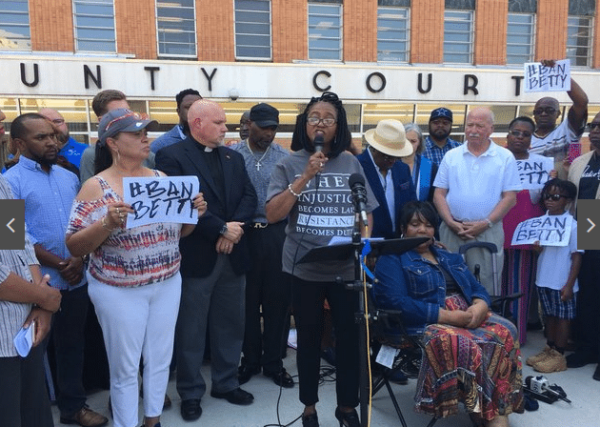An officer who was acquitted for shooting a Black man to death has received major backlash for being allowed to teach an instructional class on shooting.
Former Tulsa Police Department officer Betty Jo Shelby, who shot and killed 40-year-old Terence Crutcher in 2016, was hired to teach “surviving the aftermath” of police shootings on August 28.

(photo credit: Kjrh screenshot)
However, groups of people protested outside of the Tulsa County Sheriff’s Office on Monday. Many of the protesters felt that Shelby being selected as the instructor for the deputy training course was a slap in the face to Crutcher’s family. Many of the victim’s family members are still grieving his loss and are in the healing process. People also held signs up that read “Ban Betty.”
The founder of the “We the People Oklahoma” community watchdog group, Marq Lewis, told the Washington Post, “It’s one more indication that Betty Shelby has been rewarded while Terence Crutcher’s children are suffering still. … They don’t have anyone going around the state talking about their experiences.”
However, Shelby justified her qualifications for the training course that’s certified by the “Oklahoma Council on Law Enforcement Education and Training” and said it was “not about the shooting.” She explained to ABC, “My class is to help others by sharing some of the skills I used to cope with the stress of my critical incident. As law enforcement we experience many critical incidents throughout our career. These tools that I share are just a few to help them cope with the stress of the critical incidents they have had or will experience.”
Lewis said the issue is that the former Tulsa officer is speaking “to law enforcement that are interacting with communities of color that look like Terence Crutcher.”
Despite the several protests, Shelby will still teach the class at the courthouse on the date that marks the 55th anniversary of Martin Luther King Jr.’s “I Have a Dream” speech in Washington, when King said, “We can never be satisfied as long as the Negro is the victim of the unspeakable horrors of police brutality.”

